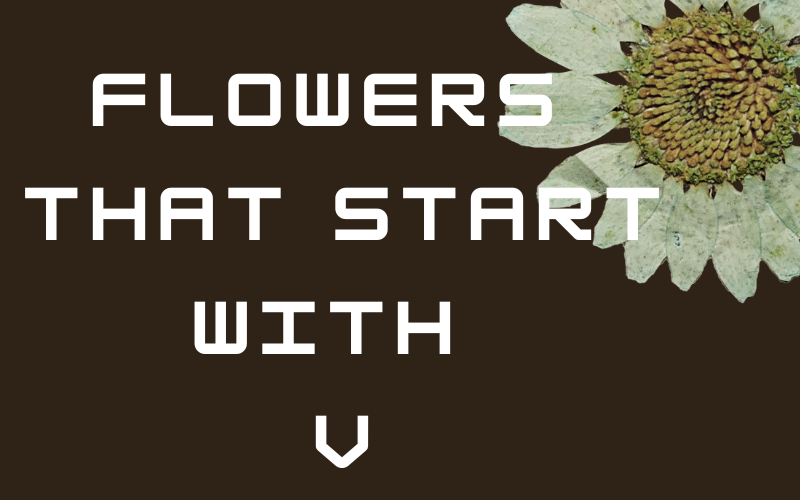There are many beautiful flowers name starting with V, some of which are popular and often used in gardens and florist arrangements. One of the most popular is the vibrant violet flower, which symbolizes loyalty, devotion, and faithfulness. The verbena flower, known for its clusters of small, colorful blooms, represents creativity and purity.
The vinca flower, also called periwinkle, features glossy green leaves and produces bright blue or violet flowers, and represents friendship and happiness. The vibrant and fragrant violet is a small, delicate flower that stands for modesty, virtue, and innocence.
Another flower that starts with V is the beautiful and exotic Vanda Orchid, which has an unusual shape and comes in a range of colors, symbolizing love, beauty, and strength.
Flowers Name Starting with V
Verbena
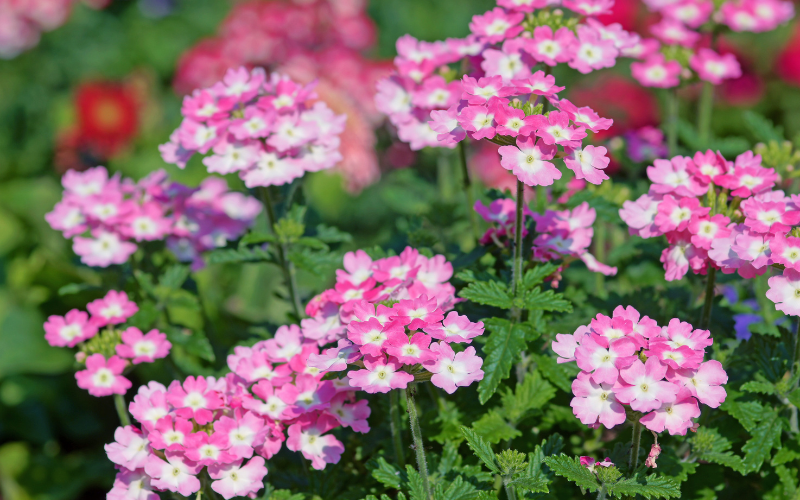
The Verbena flower is a beautiful flower that is known for its bright and vibrant colors. It is available in a range of colors, from pink and purple to blue and red, which makes it a popular choice for gardeners who love to add color to their gardens.
The Verbena is a sun-loving plant, so it should be planted in an area that receives plenty of sunlight. It prefers well-drained soil and should be watered regularly, especially during hot and dry weather. The Verbena is also a popular choice for attracting butterflies to your garden, making it a great addition for those who enjoy bird-watching. The Verbena is a beautiful and easy-to-grow flower that can add color, beauty, and wildlife to any garden.
| Scientific Name | Verbena |
| Native Range | North and South America |
| Flowering Season | Spring |
Vinca
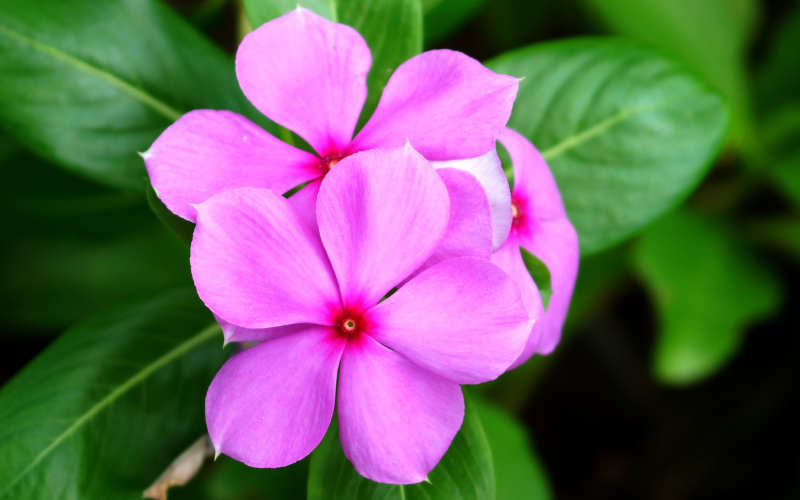
Vinca flowers are beautiful and vibrant annuals that bloom in a range of colors, from white to pink, red, and purple. Vinca flowers, also known as periwinkles. They are great for adding pops of color to your garden or outdoor space.
Vinca flowers are fairly low maintenance and easy to grow, making them great for both experienced and new gardeners. They love well-drained soil and flourish in full sun or partial shade. These flowers must be watered on a regular basis, especially during hot and dry weather. They also draw bees like butterflies and bees, making them an excellent addition to any garden. Overall, Vinca flowers are a beautiful and easy-to-grow option for anyone looking to add some color and life to their outdoor space.
| Scientific Name | Catharanthus roseus |
| Native Range | Africa |
| Flowering Season | Spring |
Vetch
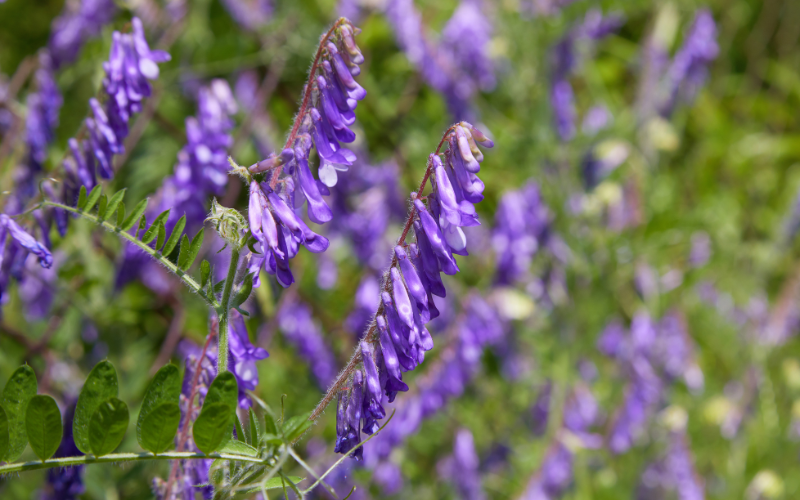
Vetch flower is a beautiful plant that belongs to the Fabaceae family and is known for its delicate and pretty flowers that come in a range of colors, from pink and purple to blue and white. It is commonly found in fields and meadows and is known for its ability to attract butterflies and bees.
The Vetch Flower is not only aesthetically pleasing, but it also has a variety of medicinal uses. The Vetch Flower can be used to improve digestion and treat skin irritations. It has been used in traditional medicine for centuries and is still widely used today. The Vetch Flower is a wonderful addition to any garden or field, whether for its beauty or therapeutic benefits.
| Scientific Name | Vicia |
| Native Range | Europe, Asia, Africa, and the Americas |
| Flowering Season | Spring and summer |
Valerian
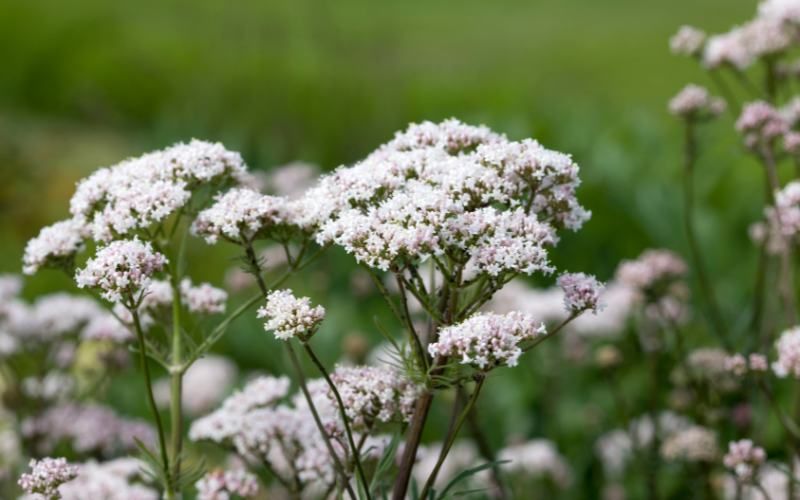
Valerian is a beautiful and fragrant flower that has been used for centuries for its medicinal properties. The plant is native to Europe and Asia and has been used to treat anxiety, insomnia, and nervousness. The Valerian plant’s root carries the majority of its beneficial properties.
The flowers of the Valerian plant are also used in perfumes and therapy, as they have a sweet and relaxing scent. Valerian, in addition to its helpful virtues, is an eye-catching plant that can lend a touch of elegance to any setting. Overall, the Valerian flower is a versatile and valuable plant that has been appreciated for its beauty and medicinal benefits for centuries.
| Scientific Name | Valeriana officinalis |
| Native Range | Europe and certain parts of Asia |
| Flowering Season | Summer |
Veronica
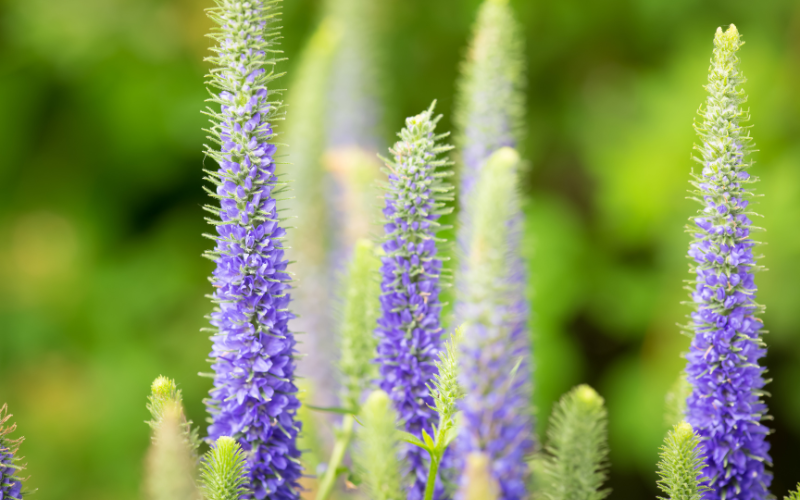
The Veronica flower is a beautiful plant native to North America and Europe. It is also known as Speedwell. These flowers are known for their tall and slender stems that are covered in clusters of small, delicate blooms that range in color from deep blue to light pink and white.
The Veronica flower is a hardy plant that can grow in a variety of soil types, making it a popular choice for gardeners who want a low-maintenance yet beautiful addition to their landscapes. The plant also attracts bees and butterflies, making it an excellent choice for those who want to create a pollinator-friendly garden. Veronica flowers bloom from early spring through late summer, providing a splash of color to any garden during the growing season.
| Scientific Name | Veronica |
| Native Range | Europe, Asia, and North America |
| Flowering Season | Spring and summer |
Violet
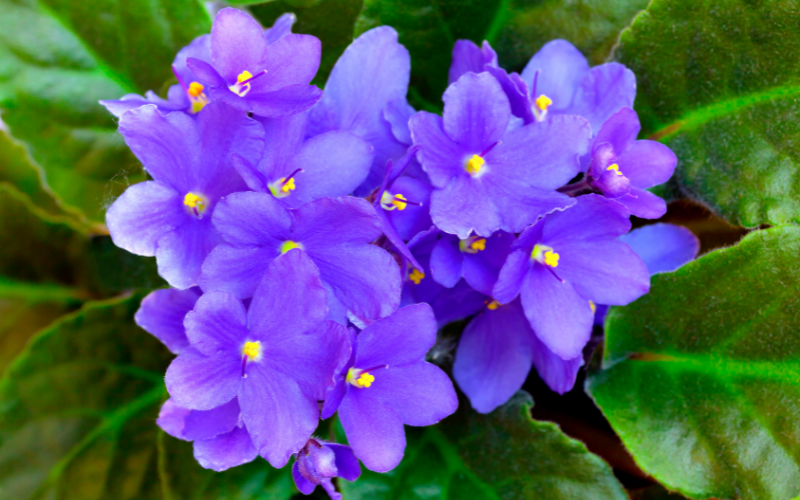
The Violet flower, also known as Viola, is a beautiful plant that has long been revered in many cultures. The flower’s color is unique, ranging from delicate tones of blue and purple to vivid pink and red colors. Violet flowers have a delicate and sweet fragrance that makes them popular in perfumes and therapy.
The violet flower has traditionally been used for therapeutic purposes. It was thought to have healing effects for both the body and the mind, and it was used to alleviate headaches, coughing, and sleep problems. The violet flower is usually associated with love and loyalty, and it is commonly given as a gift to express respect or friendship.
| Scientific Name | Viola |
| Native Range | North America, Europe, Asia, and parts of Africa and Australia |
| Flowering Season | Spring or early summer |
Virginia bluebells
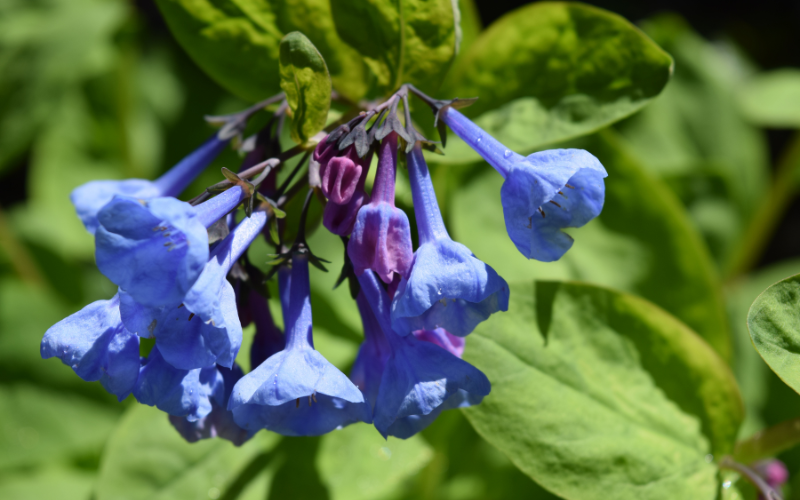
The Virginia bluebell flower is a native wildflower that is found in eastern North America. The plant grows up to two feet tall and features clusters of delicate pink buds that open up to reveal drooping blue flowers that bloom from early spring through late summer.
The flowers are known for their unique trumpet-like shape and their soft blue hue, which blends beautifully with the green foliage of the plant. The Virginia bluebell flower is often used in garden beds and borders and is a popular choice for attracting pollinators such as bees and butterflies.
| Scientific Name | Mertensia virginica |
| Native Range | North America, specifically the eastern United States and eastern Canada |
| Flowering Season | Early spring |
Virginia Sweetspire
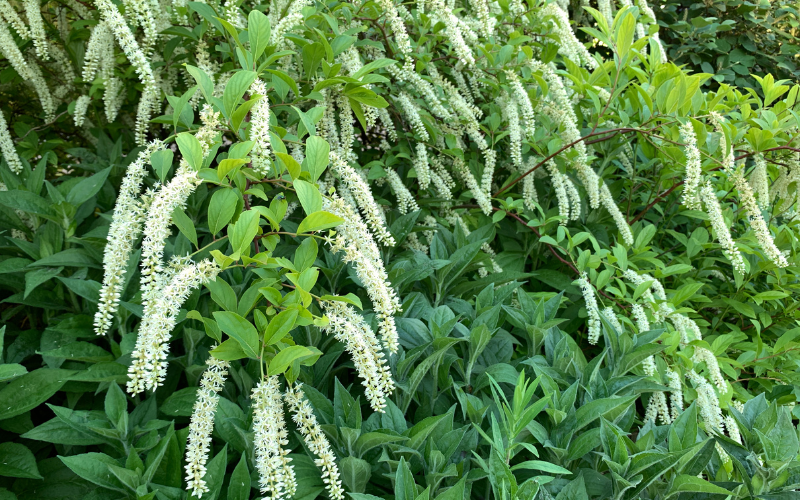
The Virginia Sweetspire flower is a stunning native shrub that is found in the eastern United States. It is known for producing beautiful and fragrant white flowers in the late spring and early summer.
This plant is a perfect addition to any garden or landscape, as it is not only beautiful but also easy to care for. The Virginia Sweetspire prefers moist, well-drained soil and partial shade, but can also tolerate full sun. It is also known for its stunning fall foliage colors, with leaves turning a bright red or orange. The Virginia Sweetspire is a popular choice among gardeners due to its showy flowers and low maintenance requirements.
| Scientific Name | Itea virginica |
| Native Range | Southeastern United States |
| Flowering Season | Late spring to early summer |
Virginia Spiderwort
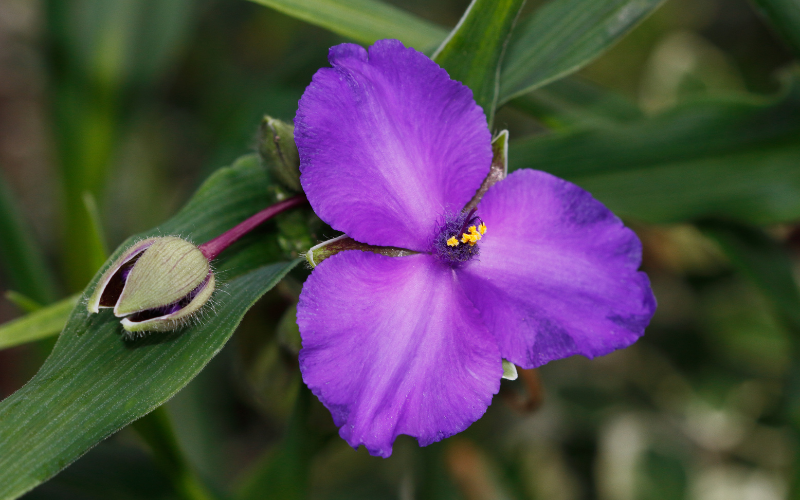
The Virginia Spiderwort Flower is a beautiful wildflower that is native to the eastern United States. It is a common sight along roadsides, in gardens, and in meadows throughout Virginia and beyond.
The plant’s three-petaled flowers come in shades of blue, pink, and purple, and bloom from May to July, attracting bees and butterflies to pollinate them. The long, slender leaves of the Virginia Spiderwort Flower are a unique blue-green color, and the plant can grow up to two feet tall. The Virginia Spiderwort Flower is not only beautiful, but it also has medicinal properties.
| Scientific Name | Tradescantia virginiana |
| Native Range | Eastern and central parts of North America, including the United States and Canada |
| Flowering Season | Late spring and early summer |
Viburnum
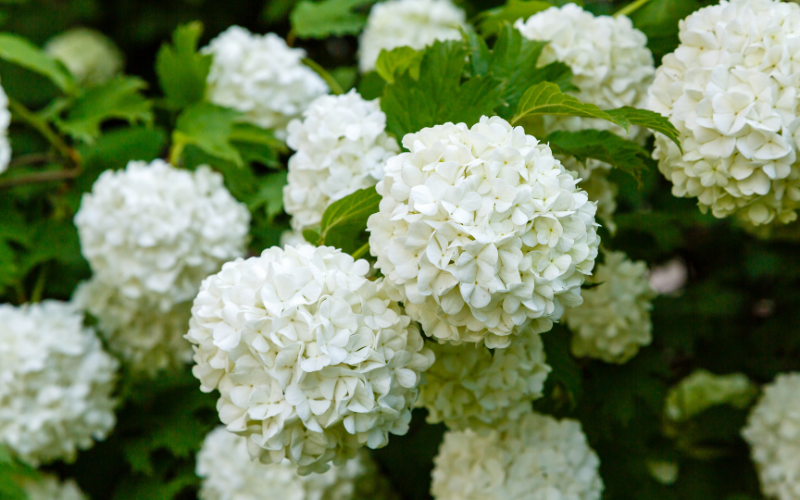
Viburnum flowers are a beautiful plant that is loved by gardeners and flower enthusiasts everywhere. These flowers are known for their lovely clusters of small, fragrant flowers that bloom in the spring and summer. The flowers come in a range of colors, including white, pink, and red. They are also great for attracting butterflies and other pollinators to your garden.
One of the great things about the Viburnum flower is that it is a relatively low-maintenance plant. It is hardy and can tolerate a wide range of soil conditions and climates. Whether you are looking to add some color and beauty to your garden or just enjoy the fragrant scent of these flowers, the Viburnum is a great choice.
| Scientific Name | Viburnum |
| Native Range | Northern Hemisphere, including North America, Europe, and Asia |
| Flowering Season | Spring and early summer |
Venus Flytrap
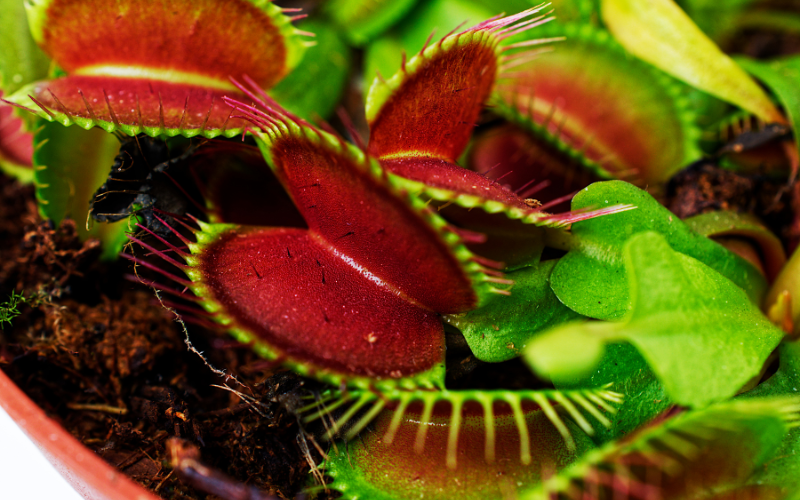
Venus Flytrap, or Dionaea muscipula, is a unique plant in the Droseraceae family. Native to the Carolina wetlands, it stands out with its vivid green color and an amazing variety of deep red markings on its leaves. It is bloom in late spring to early summer and thrive in nutrient-poor, acidic soils, growing up to 6 inches tall.
Its leaves have trigger hairs that get close when struck by an insect or small prey, catching the prey within its clutches. This unique adaptation allows the plant to get nutrients, allowing it to thrive under harsh conditions.
| Scientific Name | Dionaea muscipula |
| Native Range | North and South Carolina |
| Flowering Season | Spring |
Vanilla Orchid
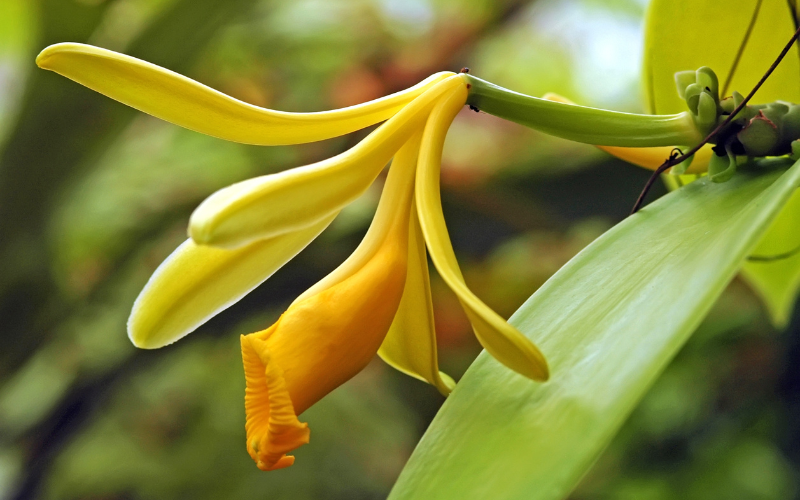
Vanilla Orchid is a beautiful member of the Orchidaceae family. It is also known as Vanilla planifolia. It is native to Mexico, and its flowers are often creamy white or pale yellow, giving a touch of elegance. Needs well-drained, organic-rich soil and can grow up to 30 feet tall during the summer months.
Long, glossy, dark green foliage matches the fragile and lovely blooms of the Vanilla Orchid and has a unique structure, with a long tubular shape and a lower lip-shaped petal. Its alluring aroma attracts pollinators like bees and hummingbirds.
| Scientific Name | Vanilla planifolia |
| Native Range | Mexico |
| Flowering Season | Summer |
Vanda Orchid
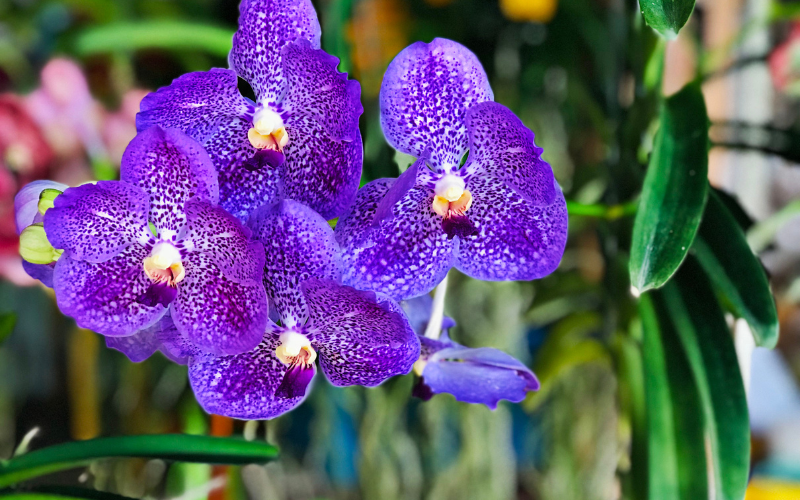
Vanda Orchid, an Orchidaceae family member, is a beautiful flower native to Southeast Asia. These come in a wide range of colors, including purple, blue, white, and orange. Blooming from spring through summer. They thrive in well-drained soil and can reach a height of 3 feet.
Vanda Orchids have a unique and lovely look. Their long, strap-shaped leaves spread in a fan-like style, and the blossoms themselves are big, with a waxy feel, and open in a star-like form. The petals often have complex designs and marks that add to their attractiveness.
| Scientific Name | Vanda |
| Native Range | Asia and the Pacific |
| Flowering Season | Spring and fall |
Victoria Amazonica
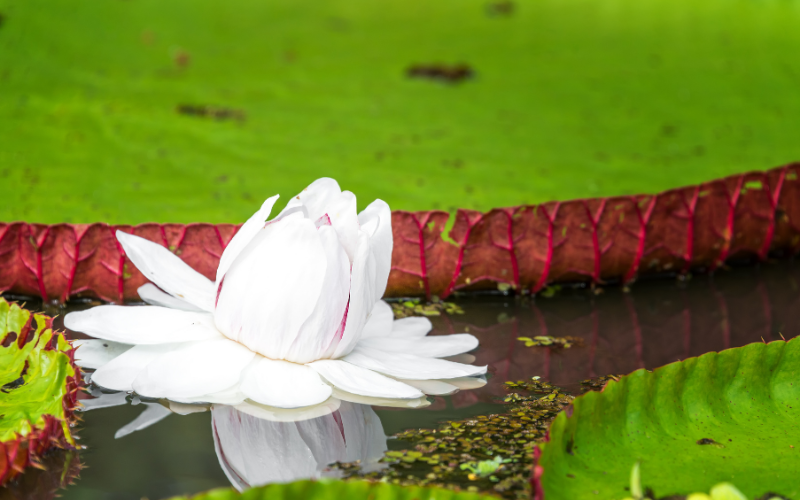
Victoria Amazonica, or giant water lily, is an amazing plant in the Nymphaeaceae family. Native to the Amazon basin, these bloom only at night, emitting an enticing aroma that attracts pollinators. It blooms from late spring to early fall, thrives in rich, loamy soil, and grows up to 9 feet in diameter, making it the world’s largest water lily.
It gives a touch of elegance to any water garden with its large floating leaves and beautiful white blossoms. It also provides a home for aquatic life and adds to the harmony of its surroundings.
| Scientific Name | Victoria amazonica |
| Native Range | Brazil, Guyana, Peru, Colombia and Venezuela |
| Flowering Season | Late spring to early autumn |
Vallota Lily
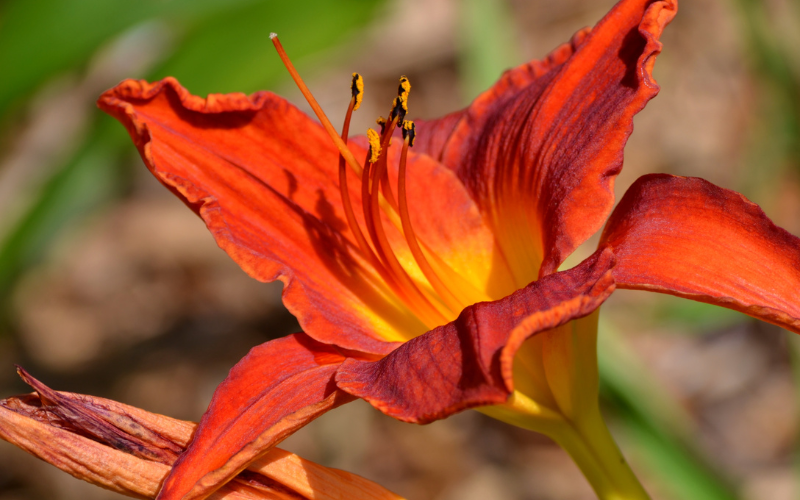
Vallota Lily, Scarborough Lily, or Blood Lily, is a beautiful flower in the Amaryllis family. Native to South Africa this comes in a variety of colors, including vivid red, orange, and pink. Blooms in late summer or early autumn prefer well-drained soil and can grow up to 2 ft. tall.
The long, strap-like leaves of the Vallota Lily offer an attractive touch to its appearance. With their bright hues and unique designs, the flowers serve as a focus point and attract pollinators. The Vallota Lily is a mesmerizing plant that will enrich any area.
| Scientific Name | (Scarborough lily) syn. Vallota speciosa |
| Native Range | South Africa |
| Flowering Season | Summer to Autumn |
Velvet Plant
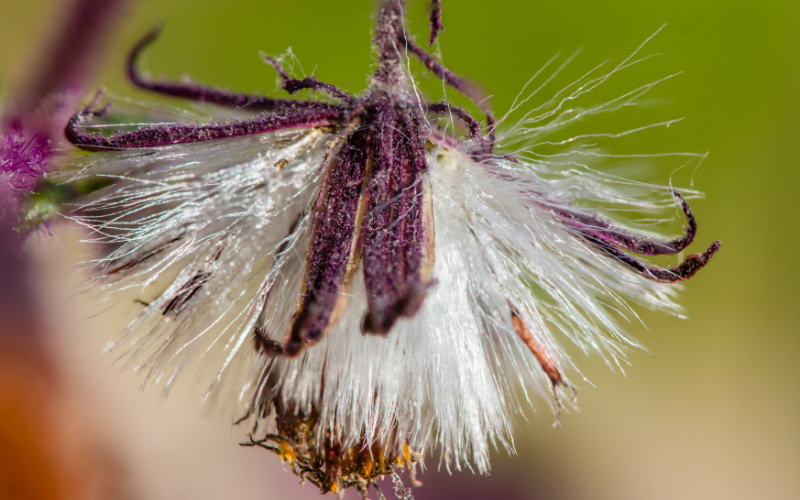
Velvet Plant, or Gynura aurantiaca, is an amazing Asteraceae family plant. Native to Southeast Asia these appear in a variety of colors, including deep purple, green, and an eye-catching blend of orange and red.
Blooms in late summer and early fall thrive in well-drained soil and can grow to be 2 ft. tall. The velvety-textured, elongated, and lance-shaped leaves give it a unique look. The Velvet Plant surely will fascinate you with its vibrant colors and distinct texture.
| Scientific Name | Abutilon theophrasti |
| Native Range | Southern Asia |
| Flowering Season | Winter |
Violette Africaine
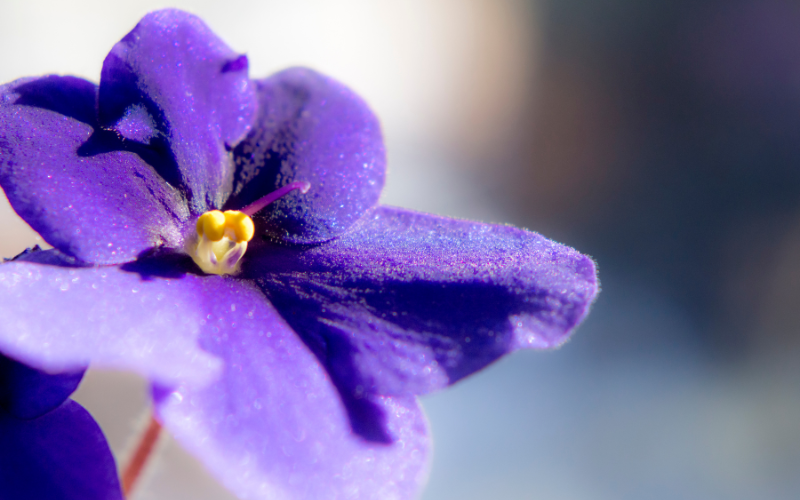
Violette Africaine, or African Violet, is a renowned houseplant in the Gesneriaceae family. Native to East Africa these come in a variety of colors ranging from deep purples to pinks, blues, and even white. Blooms in the spring and autumn thrive in well-drained soil and can reach a height of 8 inches.
Even when not in bloom, the plant’s velvety, heart-shaped leaves are covered with lovely designs, making them visually appealing. Violette Africaine stands out as a stunning addition to any indoor garden or botanical collection.
| Scientific Name | Saintpaulia |
| Native Range | Africa |
| Flowering Season | Spring, summer, fall, winter |
Vriesea
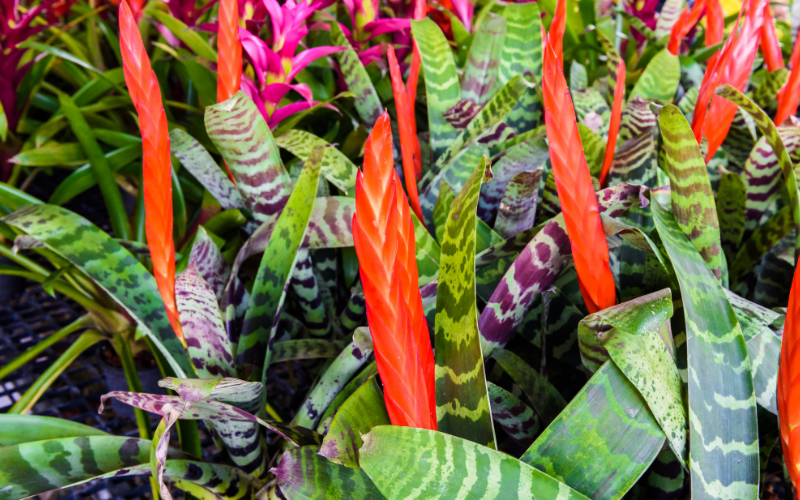
Vriesea is an amazing genus of plants in the Bromeliaceae family. Native to Central and South America they come in a variety of colors such as red, orange, yellow, and even purple. Blooming from late spring to early summer, they thrive in well-drained soil and can reach a height of 3 feet.
Their artistic growth habit and rosette-shaped leaves make them an eye-catching addition to any area. Vriesea is worth considering if you are searching for a stunning and low-maintenance plant to brighten up your living area.
| Scientific Name | Vriesea |
| Native Range | Trinidad, eastern Venezuela and the Guianas |
| Flowering Season | Three to five years |
Violet Trumpet Vine
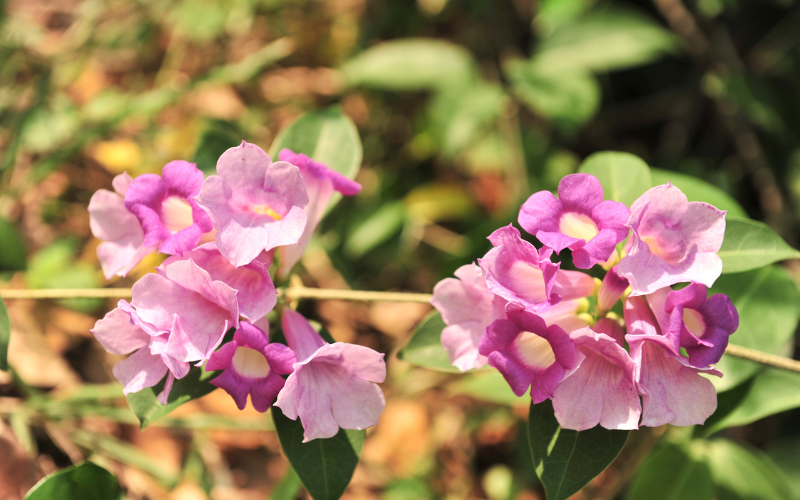
Violet Trumpet Vine, also known as Clytostoma callistegioides, is a lovely plant in the Bignoniaceae family. Native to South America this is prized for its beautiful purple blossoms, which bloom from late spring to early summer and attract bees, butterflies, and hummingbirds.
It prefers well-drained soil, grows well in full sun or partial shade, and can grow to be 40 ft. tall. The Violet Trumpet Vine is a true natural wonder that improves any space with its flowing clusters of trumpet-shaped blooms.
| Scientific Name | Clytostoma callistegioides |
| Native Range | Southern Brazil and Argentina. Clytostoma callistegioides (Cham.) |
| Flowering Season | Late spring to summer |
Violet Sage
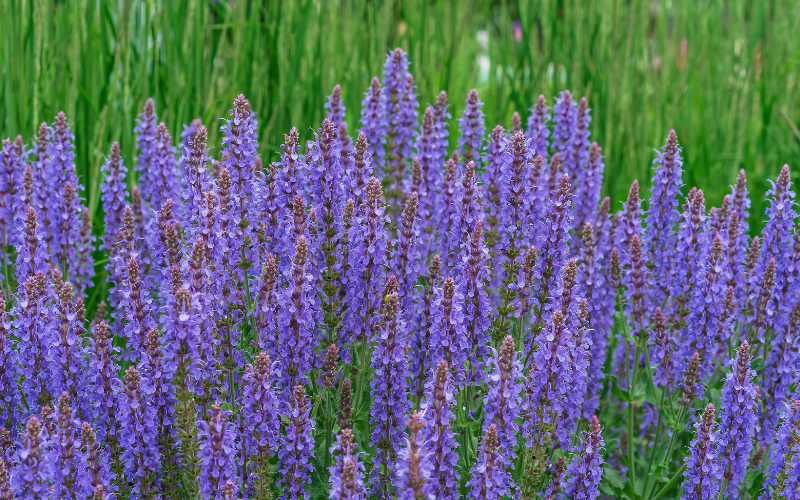
Violet Sage, or Salvia dorrii, is a beautiful plant of the Lamiaceae mint family. Native to western North America it has lovely purple flowers that bloom from late spring to early summer. The plant grows up to 3 ft. tall and prefers well-drained soil.
Violet Sage has thin, silvery-green leaves that are covered in tiny hairs. When crushed, the aromatic leaves emit a pleasant scent and have long, thin stalks that bear several little blooms, each with its own distinct color. These flowers are arranged in groups to create an appealing look.
| Scientific Name | Salvia |
| Native Range | Southern coast of California and Baja California, with a range stretching from Santa Maria southward |
| Flowering Season | Late spring or early summer and usually last into midsummer |
Viper’s Bugloss
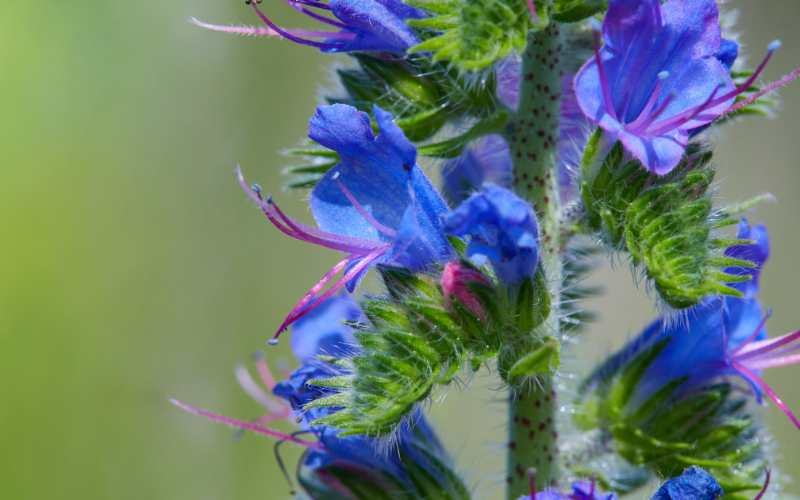
Viper’s Bugloss, or Echium vulgare, is a unique plant in the Boraginaceae family. It is native to Europe and Western Asia it has blue, purple, or pink flowers that attract bees and butterflies with their nectar-rich blossoms. Blooms during the summer months, thrive in well-drained soils and can reach a height of 3 feet.
Viper’s Bugloss is quite stunning. Its rosette, elongated, lance-shaped leaves give rise to tall, erect stems decorated with clusters of amazing blooms. The flowers are tubular in shape, with large petals that rise outward.
| Scientific Name | Echium vulgare |
| Native Range | Europe and western and central Asia and it occurs as an introduced species in north-eastern North America, south-western South America, and the South and North Island of New Zealand |
| Flowering Season | Summer |
Vetchling
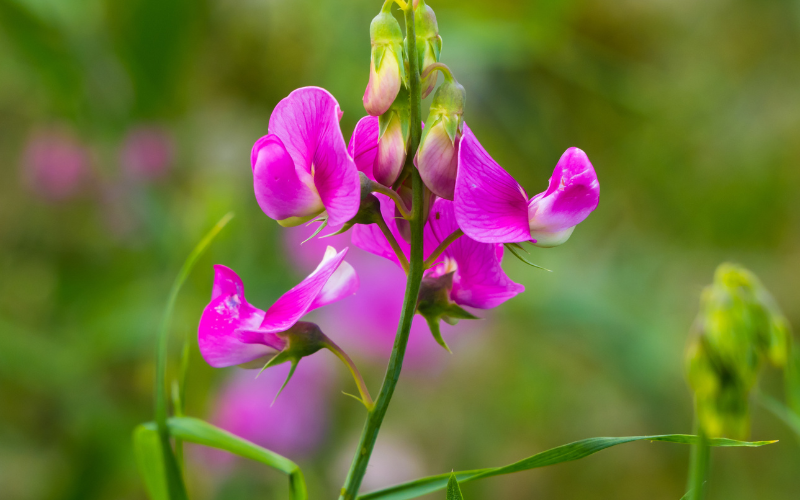
Vetchling, or Lathyrus aphaca, is an attractive member of the Fabaceae legume family. Native to Europe and Asia and comes in a variety of colors including red, pink, purple, and white. Blooms in late spring or early summer, thrive in well-drained, fertile soils, and can reach a height of 3 feet.
Vetchling is an amazing sight to behold as its delicate leaves are sharp, made up of many leaflets that are grouped along a central stem. Flowers are grouped in clusters and have a lovely look, making them a popular choice among garden lovers.
| Scientific Name | Lathyrus |
| Native Range | Europe and Asia |
| Flowering Season | Summer |
Violet Wood Sorrel
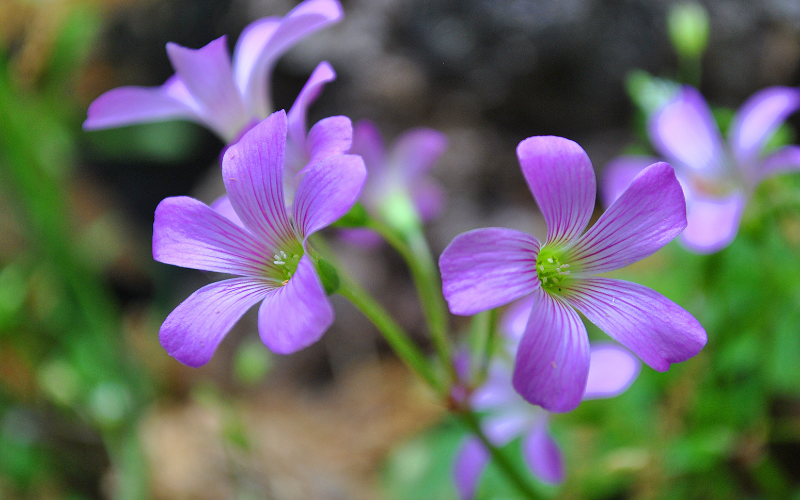
Violet Wood Sorrel, or Oxalis violacea, is a beautiful plant in the Oxalidaceae family. Colors range from pastel pink to deep violet and are native to North America. Blooms in the spring and summer, thrive in well-drained soil and can reach a height of 12 inches.
Violet Wood Sorrel has a trifoliate design, with three heart-shaped leaflets on each leaf. At night or during cloudy weather, the leaves fold up, creating an amazing show. Violet Wood Sorrel is an alluring and valuable addition to any garden due to its bright colors and flexibility.
| Scientific Name | Oxalis violacea |
| Native Range | South America, including countries like Brazil, Argentina, and Uruguay |
| Flowering Season | Late spring, summer, and sometimes early autumn |
Velvetleaf
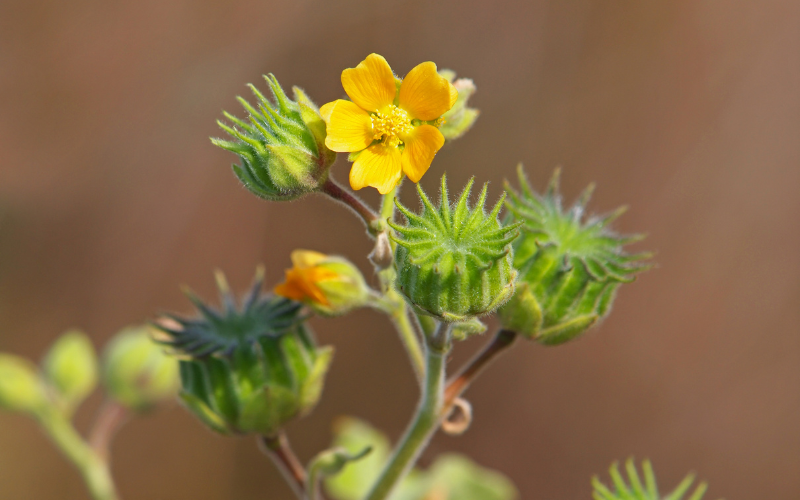
Velvetleaf, commonly known as Abutilon theophrasti, is an intriguing plant of the Malvaceae family. These are native to Asia and come in different colors including yellow, orange, and even crimson. Blooming from mid-summer to early autumn, this plant thrives in well-drained soils with moderate fertility and can grow up to 7 ft. tall.
Its leaves are big and heart-shaped, with a silky feel along with cup-shaped blossoms. As the plant matures, it produces unique seed pods that are round and spiky in appearance and contain many seeds.
| Scientific Name | Abutilon theophrasti |
| Native Range | North America and Europe |
| Flowering Season | Mid-summer to early autumn |
Veldt Daisy
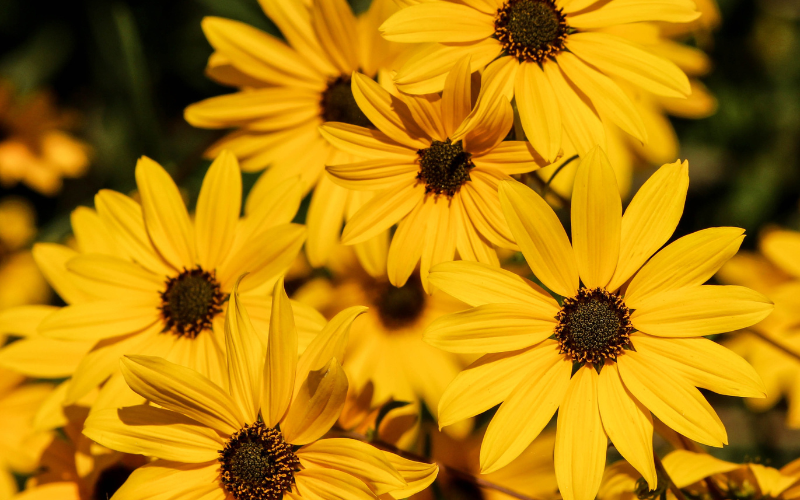
Veldt Daisy, also known as Gerbera ambigua, is a beautiful flower of the Asteraceae family. This South African native has colors ranging from bright oranges and cheery yellows to gentle pinks and deep reds.
Blooms from spring through summer prefer well-drained soil and can reach a height of 2 feet. Displaying its huge, daisy-like flowers with a black center and attracting bees and butterflies with its nectar-rich flowers, the Veldt Daisy is a truly beautiful species worth seeing
| Scientific Name | Dimorphotheca ecklonis |
| Native Range | South Africa |
| Flowering Season | Winter and spring |
Velvet Lupine
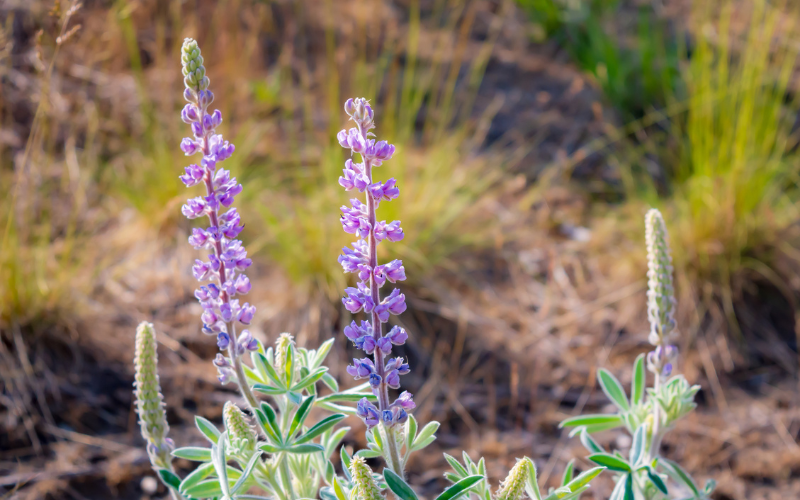
Velvet Lupine, or Lupinus leucophyllus, is a lovely flower in the Fabaceae family. Native to the western United States these range in color from rich purples and blues to vivid pinks and whites. Blooms from late spring to early summer thrive in well-drained soils and can reach a height of 3 feet.
With tall flower spikes filled with compact, pea-like flowers, it has a delicate and graceful structure. Its leaves are covered with soft, velvety hairs, and in full bloom, the Velvet Lupine creates a stunning display, attracting pollinators such as bees and butterflies.
| Scientific Name | Lupinus leucophyllus |
| Native Range | Western North America |
| Flowering Season | Early summer |
Vanilla Lily
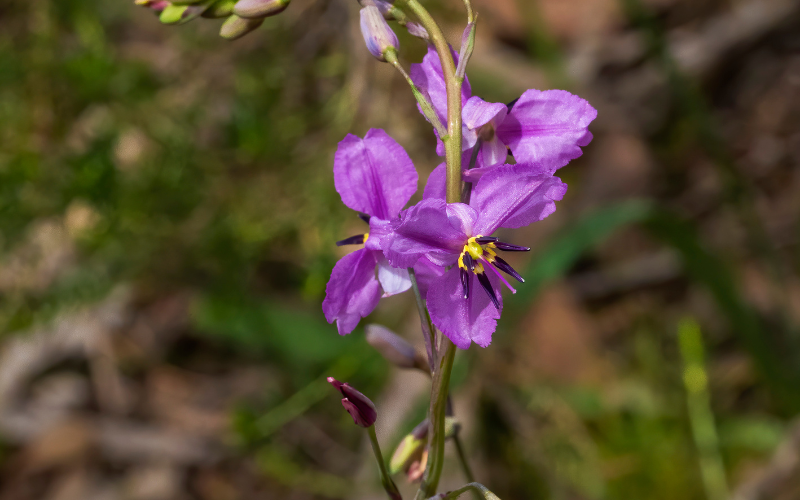
Vanilla Lily, scientifically known as Arthropodium cirratum, is a wonderful plant in the Asparagaceae family. Native to New Zealand and Australia these occur in white, cream, and pale pink. Blooms during the spring and early summer prefers well-drained, slightly acidic soil, and can grow to be 2 ft. tall.
The Vanilla Lily is known for its delicate and beautiful appearance, with thin green leaves displaying small, star-shaped flowers, and is sure to bring elegance and charm to any garden setting.
| Scientific Name | Arthropodium milleflorum |
| Native Range | New Zealand |
| Flowering Season | Late spring and summer |
Veronicastrum
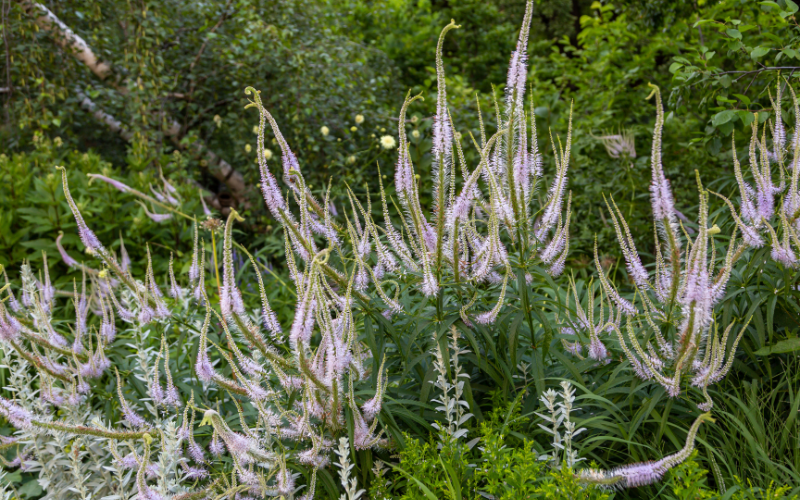
Veronicastrum, also known as Culver’s Root, is a member of the Plantaginaceae family. These are native to North America and range in color from purple and pink to white and blue. These bloom in the summer months and thrive in well-drained soil, growing up to 6 feet tall.
Veronicastrum has tall, erect stems that are covered with groups of lance-shaped leaves, offering visual appeal to the garden while attracting pollinators such as bees and butterflies with its nectar-rich blooms.
| Scientific Name | Veronicastrum virginicum (L.) Farw. – Culver’s rootP |
| Native Range | Eastern United States and south-eastern Canada |
| Flowering Season | Autumn and winter |
Vervain
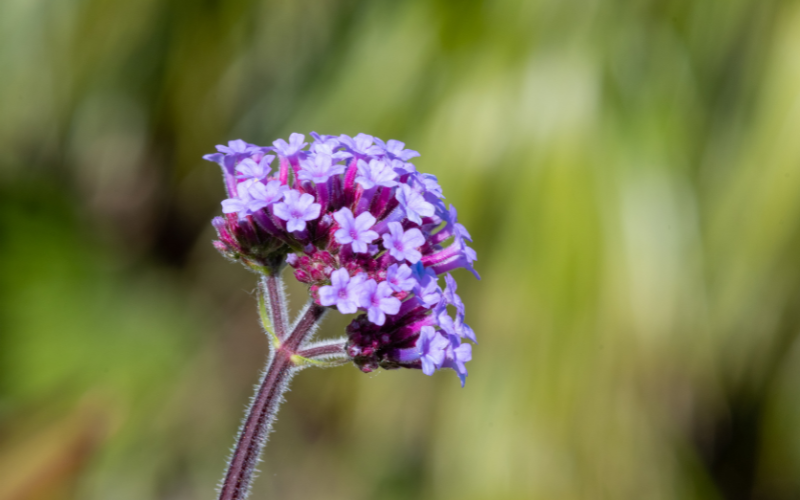
Vervain, or Verbena, is a plant native to Europe, Asia, and North America that belongs to the Verbenaceae family. Blooms in the summer months, attract pollinators like butterflies and bees with their fragrant flowers. Vervain has brilliant purple, blue, pink, and white hues, thrives on well-drained soils, and can grow up to 3 ft. tall.
Vervain stands out by its thin stems and short, lance-shaped leaves. Blooms are arranged in thick clusters and have a mild aroma, which adds a sensual experience to their visual attraction.
| Scientific Name | Verbena officinalis |
| Native Range | Americas and Asia |
| Flowering Season | Late spring to early autumn |
Verbascum Southern Charm
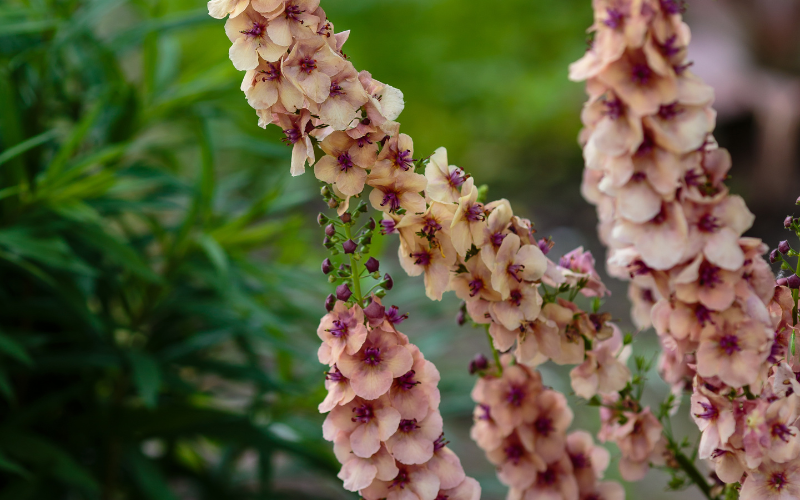
Verbascum Southern Charm is a beautiful flower of the Verbascum family. Native to southern Europe these come in a range of colors, including pink, purple, and yellow. Blooms from late spring to early summer prefer well-drained soil and can reach a height of 3 feet.
This plant has tall, tall stems with velvety leaves and delicate, clustered flowers, giving a striking visual display. Verbascum Southern Charm is a versatile and attractive plant whether as a focal point in a garden or as a colorful addition to a floral arrangement.
| Scientific Name | Verbascum x hybrida |
| Native Range | Europe to North Africa to Western and Central Asia |
| Flowering Season | Late spring to summer |
Question & Answer
What herbaceous plant starts with V?
One herbaceous plant that starts with the letter “V” is Verbena
What is the least common flower?
The Middlemist Red is a flowering plant native to China and is considered one of the rarest flowers in the world.
Which flower is the easiest flower to grow?
Marigolds, sunflowers, and zinnias are several flowers that are known for being relatively easy to grow, making them suitable for beginners or those with limited gardening experience.
Which season is a full flower?
In many temperate regions, spring is often considered the season of abundant flowering.
